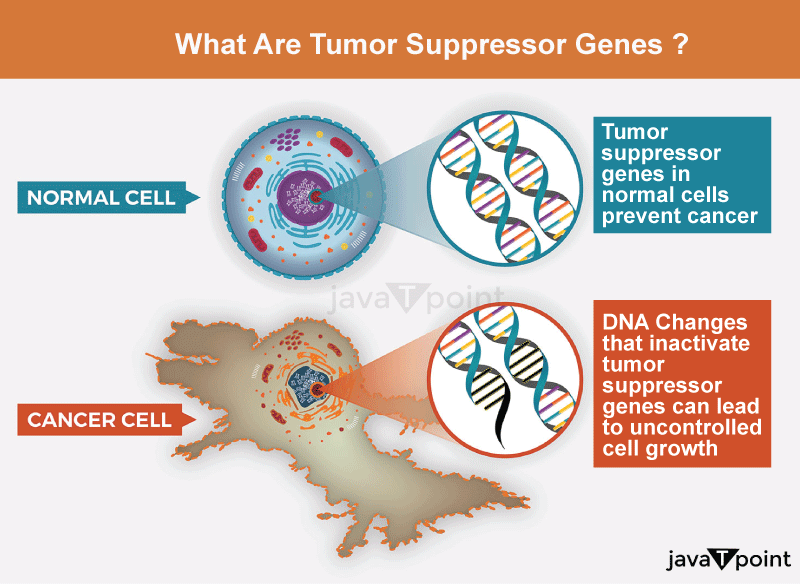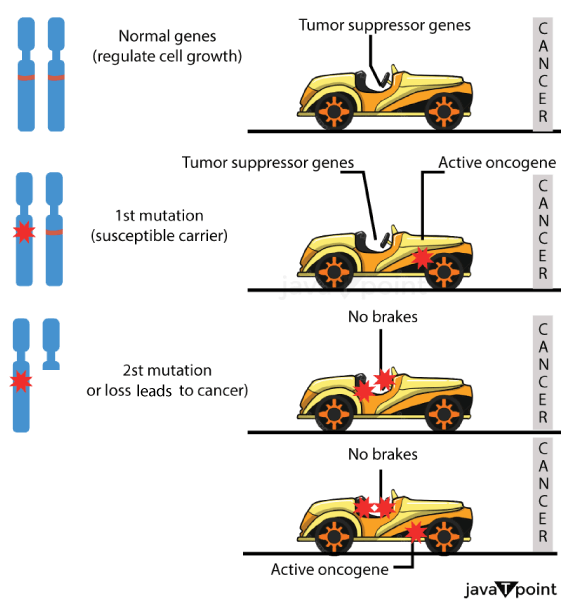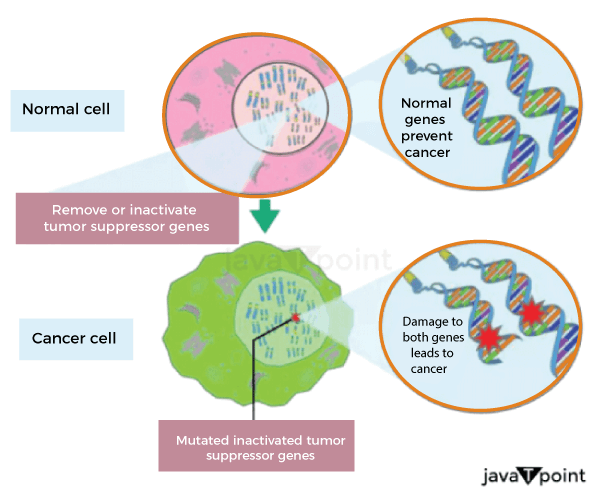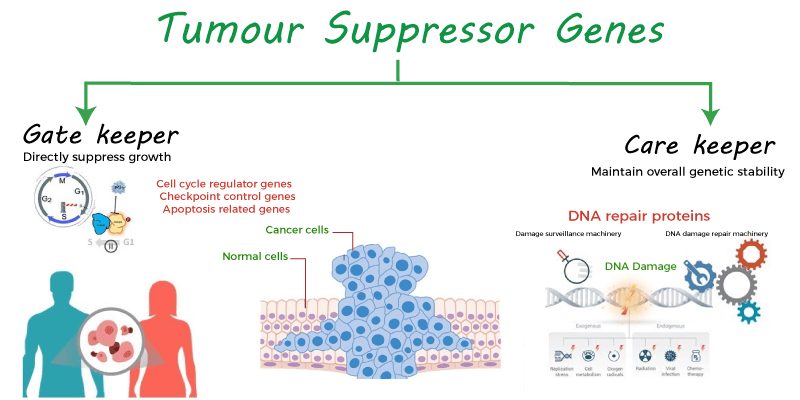Tumor Suppressor GeneA tumor suppressor gene makes a protein that controls cell division. When the gene is mutated, the protein may not perform adequately and unchecked cell division can arise. This mutation could lead to cancer development. Tumor suppressor genes exist in all cells of our body. When functioning, they avert cell development and division - identical to the brakes of an automobile. Regardless, if a tumor suppressor gene is swapped off due to omission or mutation, the brake is discharged, and the cell may start developing uncontrollably. This can direct to cancer maturation. DefinitionTumor suppressor genes act as "gatekeeper" genes by inhibiting cell growth, fixing damaged DNA and causing a cell to die. These genes perform as the brakes of an automobile in three primary methods. Some tumor suppressor genes act as caretakers, producing proteins that oversee and regulate other genes to maintain DNA stability. The genes Rb, APC, and p53 act as gatekeepers while BRCA1/BRCA2 function as caretakers that control the activity of other proteins for cell growth and repair. 
Tumor Suppressor Genes TypesTumor suppressor genes have three types with different functions.

Working of Tumor SuppressorTumor suppressor genes are vital to our body's cellular machinery. They create proteins that act as brakes, preventing uncontrolled cell growth and division. If a tumor suppressor gene mutates or gets deleted, its protein may not work correctly, causing the release of these breaks and allowing cells to grow uncontrollably. This lack of control over cell division can lead to severe consequences, possibly contributing to cancer development. Moreover, Malfunctioning tumor suppressor genes can provoke cells to separate uncontrollably and form gatherings known as tumors. If these tumors are not stopped, they can spread throughout the body and cause significant harm. Understanding how tumor suppressor genes perform is crucial to generate efficacious cancer treatments. Researchers can create targeted therapies that restore normal cellular function and prevent uncontrolled growth by studying their processes and identifying contributing mutations. This research could bring us closer to finding a cure for this disease. Why do individuals have mutated tumor suppressor genes?Inheriting mutated tumor suppressor genes from biological parents can lead to conditions like Li-Fraumeni syndrome. It means the egg or sperm that creates cells carries abnormal genes. Some people who take birth with one mutated tumor suppressor gene may originate another subsequently in life, which increases their chance of producing respective cancers such as breast cancer. However, inheriting these genes does not necessarily mean an individual will have cancer. In general, tumor suppressor genes mutate as people age. Our bodies are like a multitude of lines assembling new genes at maximum velocity. Mistakes can happen along the line; if not corrected, mistakes become more frequent over time. It contains blunders that drive tumor suppressor genes to quit functioning. 
What are examples of tumor suppressor gene mutations?Health experimenters have discovered over a thousand tumor suppressor genes that can drive cancer when mutated. 1) TP53 (P53) Modifications in the p53 gene are noticed in over half of all cancer types. 2) RB1 The RB1 gene is the earliest known explanation of conversions in a tumor suppressor gene driving cancer. Studies indicate that individuals with breast and prostate cancer normally have mutated RB1 genes. 3) CDKN2A Individuals with family melanoma and family pancreatic carcinoma have mutated CDKN2a genes, which occur in about 25% to 30% of cancers found in individuals in their lifetimes. These cancers comprise breast, pancreatic cancer, bladder, and lung. 4) BRCA1 The BRCA1 gene mutation is present in people with inherited breast as well as ovarian cancer and in those who suffer from ovarian cancer during their lifetime. Those with inherited breast cancer may even carry the corresponding BRCA2 gene. These mutations elevate the likelihood of generating various kinds of cancer, like breast and ovarian. In particular instances, healthcare providers may recommend genetic testing for individuals who have a family record of either kind of cancer. 5) APC Gardner and Turcot syndromes are generated by a mutated form of the APC gene, which has been connected to colorectal and liver cancer. 6) PTEN Individuals with diverse kinds of cancer, involving breast cancer, head and neck squamous carcinoma, prostate cancer, and follicular thyroid cancer, contain mutated PTEN genes. Are there tests for tumor suppressor gene mutations?Genetic testing can specify precise mutations in tumor suppressor genes, but not everyone is eligible for these tests. The National Cancer Institute advises that individuals with the following conditions may benefit from genetic testing for cancer.
It is not confirmed that genetic testing for cancer will give you correct answers. Also, holding a genetic mutation does not assure the growth of cancer, but it may increase the risk. If you're anxious about your cancer danger, ask your healthcare provider to estimate your health, lifestyle practices, and family medical record. They can proffer cancer screening examinations that don't constantly need genetic testing. 
Tumor suppressor genes protect against cancer by controlling cell division, ensuring damaged cells die and repairing DNA damage. Mutations in these genes can induce rapid cell development and tumor appearance. In studies, over 1,000 of these genes have been determined; tests are open to detect mutations. However, not everyone is eligible for testing. If you're worried about your cancer risk, ask a healthcare provider for advice on reducing it and recommended screening tests. ConclusionAfter researching and analyzing, we can conclude that tumor suppressors are crucial in preventing cancer development and progression. These genes regulate cell growth, division, and death as guardians of the genome. Mutations or silencing of these genes can induce unmanageable cell division and tumor formation. It is important to understand the role and significance of tumor suppressors to promote our proficiency in cancer biology. This understanding can inform new strategies for detecting cancer early and targeting therapies that restore normal gene function in patients with compromised tumor suppression mechanisms. FAQs1. What are the tumor suppressor genes' functions? Tumor suppressor genes protect against cancer by regulating cell division, ensuring old or damaged cells are removed to make way for new ones, and repairing DNA damage caused by rapid cell division. 2. What's the most significant tumor suppressor gene? The TP53 gene is an essential tumor suppressor gene and the most continually modified one in individual cancers. Mutations that inactivate this nuclear phosphoprotein gene also avert it from regulating the cell cycle. 3. What are the main tumor suppressor proteins? P16 is a protein that suppresses tumors and regulates the cell cycle by inhibiting CDK. This delays the advancement of the cell cycle by shutting down CDK, which phosphorylates retinoblastoma protein - another tumor suppressor protein that also restrains the cell division.
Next TopicCRISPR Gene Editing
|
 For Videos Join Our Youtube Channel: Join Now
For Videos Join Our Youtube Channel: Join Now
Feedback
- Send your Feedback to [email protected]
Help Others, Please Share









